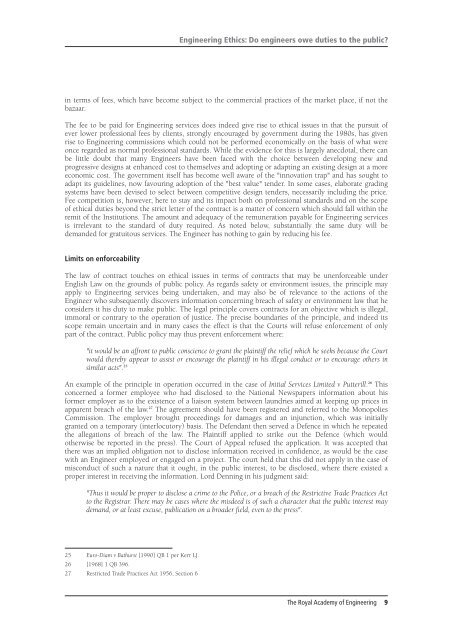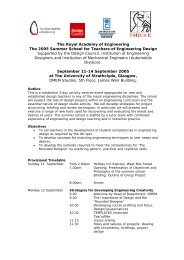Engineering Ethics: Do engineers owe duties to the
Engineering Ethics: Do engineers owe duties to the
Engineering Ethics: Do engineers owe duties to the
Create successful ePaper yourself
Turn your PDF publications into a flip-book with our unique Google optimized e-Paper software.
<strong>Engineering</strong> <strong>Ethics</strong>: <strong>Do</strong> <strong>engineers</strong> <strong>owe</strong> <strong>duties</strong> <strong>to</strong> <strong>the</strong> public?<br />
in terms of fees, which have become subject <strong>to</strong> <strong>the</strong> commercial practices of <strong>the</strong> market place, if not <strong>the</strong><br />
bazaar.<br />
The fee <strong>to</strong> be paid for <strong>Engineering</strong> services does indeed give rise <strong>to</strong> ethical issues in that <strong>the</strong> pursuit of<br />
ever l<strong>owe</strong>r professional fees by clients, strongly encouraged by government during <strong>the</strong> 1980s, has given<br />
rise <strong>to</strong> <strong>Engineering</strong> commissions which could not be performed economically on <strong>the</strong> basis of what were<br />
once regarded as normal professional standards. While <strong>the</strong> evidence for this is largely anecdotal, <strong>the</strong>re can<br />
be little doubt that many Engineers have been faced with <strong>the</strong> choice between developing new and<br />
progressive designs at enhanced cost <strong>to</strong> <strong>the</strong>mselves and adopting or adapting an existing design at a more<br />
economic cost. The government itself has become well aware of <strong>the</strong> "innovation trap" and has sought <strong>to</strong><br />
adapt its guidelines, now favouring adoption of <strong>the</strong> "best value" tender. In some cases, elaborate grading<br />
systems have been devised <strong>to</strong> select between competitive design tenders, necessarily including <strong>the</strong> price.<br />
Fee competition is, h<strong>owe</strong>ver, here <strong>to</strong> stay and its impact both on professional standards and on <strong>the</strong> scope<br />
of ethical <strong>duties</strong> beyond <strong>the</strong> strict letter of <strong>the</strong> contract is a matter of concern which should fall within <strong>the</strong><br />
remit of <strong>the</strong> Institutions. The amount and adequacy of <strong>the</strong> remuneration payable for <strong>Engineering</strong> services<br />
is irrelevant <strong>to</strong> <strong>the</strong> standard of duty required. As noted below, substantially <strong>the</strong> same duty will be<br />
demanded for gratui<strong>to</strong>us services. The Engineer has nothing <strong>to</strong> gain by reducing his fee.<br />
Limits on enforceability<br />
The law of contract <strong>to</strong>uches on ethical issues in terms of contracts that may be unenforceable under<br />
English Law on <strong>the</strong> grounds of public policy. As regards safety or environment issues, <strong>the</strong> principle may<br />
apply <strong>to</strong> <strong>Engineering</strong> services being undertaken, and may also be of relevance <strong>to</strong> <strong>the</strong> actions of <strong>the</strong><br />
Engineer who subsequently discovers information concerning breach of safety or environment law that he<br />
considers it his duty <strong>to</strong> make public. The legal principle covers contracts for an objective which is illegal,<br />
immoral or contrary <strong>to</strong> <strong>the</strong> operation of justice. The precise boundaries of <strong>the</strong> principle, and indeed its<br />
scope remain uncertain and in many cases <strong>the</strong> effect is that <strong>the</strong> Courts will refuse enforcement of only<br />
part of <strong>the</strong> contract. Public policy may thus prevent enforcement where:<br />
"it would be an affront <strong>to</strong> public conscience <strong>to</strong> grant <strong>the</strong> plaintiff <strong>the</strong> relief which he seeks because <strong>the</strong> Court<br />
would <strong>the</strong>reby appear <strong>to</strong> assist or encourage <strong>the</strong> plaintiff in his illegal conduct or <strong>to</strong> encourage o<strong>the</strong>rs in<br />
similar acts". 25<br />
An example of <strong>the</strong> principle in operation occurred in <strong>the</strong> case of Initial Services Limited v Putterill. 26 This<br />
concerned a former employee who had disclosed <strong>to</strong> <strong>the</strong> National Newspapers information about his<br />
former employer as <strong>to</strong> <strong>the</strong> existence of a liaison system between laundries aimed at keeping up prices in<br />
apparent breach of <strong>the</strong> law. 27 The agreement should have been registered and referred <strong>to</strong> <strong>the</strong> Monopolies<br />
Commission. The employer brought proceedings for damages and an injunction, which was initially<br />
granted on a temporary (interlocu<strong>to</strong>ry) basis. The Defendant <strong>the</strong>n served a Defence in which he repeated<br />
<strong>the</strong> allegations of breach of <strong>the</strong> law. The Plaintiff applied <strong>to</strong> strike out <strong>the</strong> Defence (which would<br />
o<strong>the</strong>rwise be reported in <strong>the</strong> press). The Court of Appeal refused <strong>the</strong> application. It was accepted that<br />
<strong>the</strong>re was an implied obligation not <strong>to</strong> disclose information received in confidence, as would be <strong>the</strong> case<br />
with an Engineer employed or engaged on a project. The court held that this did not apply in <strong>the</strong> case of<br />
misconduct of such a nature that it ought, in <strong>the</strong> public interest, <strong>to</strong> be disclosed, where <strong>the</strong>re existed a<br />
proper interest in receiving <strong>the</strong> information. Lord Denning in his judgment said:<br />
"Thus it would be proper <strong>to</strong> disclose a crime <strong>to</strong> <strong>the</strong> Police, or a breach of <strong>the</strong> Restrictive Trade Practices Act<br />
<strong>to</strong> <strong>the</strong> Registrar. There may be cases where <strong>the</strong> misdeed is of such a character that <strong>the</strong> public interest may<br />
demand, or at least excuse, publication on a broader field, even <strong>to</strong> <strong>the</strong> press".<br />
25 Euro-Diam v Bathurst [1990] QB 1 per Kerr LJ.<br />
26 [1968] 1 QB 396.<br />
27 Restricted Trade Practices Act 1956, Section 6<br />
The Royal Academy of <strong>Engineering</strong> 9

















